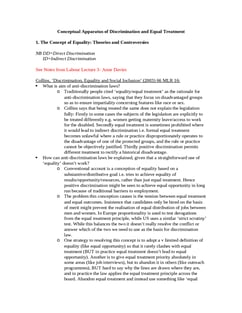Enderby v Frenchay Health Authority C-127/92 [1994] 1 All ER 495
Judgement for the case Enderby v Frenchay Health Authority C-127/92
Table Of Contents
Dr. Enderby was a speech therapist employed by the Frenchay Health Authority. on a salary of £10,106 pa. Speech therapists are predominantly women.
The pay of other comparable professionals of a similar level of seniority to Dr. Enderby was higher - a principal pharmacist got £12,527 and a "Grade III principal pharmacist" was paid £14,106. They are not predominantly women.
-
She claimed equal pay within EqPA, and CA referred to ECJ the question of whether there was objective justification under Article 141 because of the individual negotiating structures for the different comparator professions.
Also if a shortage in the better paid profession explained part of the pay difference, should the difference as a whole (or only part) be regarded as justified?
-
ECJ held that:
Where a prima facie case for discrimination was made out (i.e. pay difference) then burden was on employer to show objective justification.
Distinct bargaining processes did not objectively justify the pay difference.
Market forces (labour shortages, etc.) could only justify pay differences to the proportion that they actually had an impact.
ECJ judgement seems to go against Lord Templeman’s dictum in Leverton.
ECJ
Where significant statistics disclose an appreciable difference in pay between two jobs of equal value, one of which is carried out almost exclusively by women and the other predominantly by men, article 119 of the Treaty requires the employer to show that that difference is based on objectively justified factors unrelated to any discrimination on grounds of sex.
Collective and other bargaining processes must still respect Article 141 therefore they don’t constitute objective justification.
On market forces, labour supply, etc., it is for national courts to find the facts.
If the national court has been able to determine precisely what proportion of the increase in pay is attributable to market forces, it must necessarily accept that the pay differential is objectively justified to the extent of that proportion.
When national authorities have to apply Community law, they must apply the principle of proportionality.
RELATED CASES
For Further Study on Enderby v Frenchay Health Authority C-127/92
Need instant answers? Our AI exam tutor is here to help.
Ask questions 🙋 Get answers 📔 It's simple 👁️👄👁️
Our AI is educated by the highest scoring students across all subjects and schools. Join hundreds of your peers today.
Get StartedSimilar Cases
Related Product Samples
These product samples contain the same concepts we cover in this case.
| Labour Law | Labour Discrimination Notes (64 pages) |
| Labour Law | Unfair Dismissal Including Empirical Data Notes (44 pages) |

 Since 2010, Oxbridge Notes has been a trusted education marketplace, supplying high-quality materials from top achievers at universities like Oxford, Cambridge, LSE, Harvard, and Yale.
Since 2010, Oxbridge Notes has been a trusted education marketplace, supplying high-quality materials from top achievers at universities like Oxford, Cambridge, LSE, Harvard, and Yale.